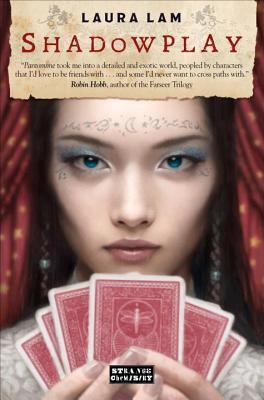B.R. Sanders's Blog, page 24
July 14, 2015
Book Review: THE MARTIAN CHRONICLES
I think I first read The Martian Chronicles in junior high. Around then, I’d read anything by Bradbury I could get my hands on. I was always rather grateful he’s so prolific. And I remember really liking The Martian Chronicles, but when I picked up a copy a couple of months ago I found I didn’t really remember anything concrete about it. Just that I liked it.
On rereading it, I’ve found I still really like it, though probably not for the same reasons I did back when I was twelve or so. It’s a book ultimately concerned with the ambivalent nature of man — a deep-seated greediness married to a gentler, more altruistic side — and the cyclical nature of change. It traces the settlement of Mars by humans, which results in the accidental genocide of the native Martians via chickenpox and the humans’ attempts to change Mars into a place more comfortable to them. They plant trees to increase the oxygen level in the planet’s atmosphere (a move which, though not directly addressed in the book, strikes me as the sort of thing that would have disastrous downstream consequences) and build towns that look just like the ones they left. Some even build hot dog stands. But when atomic war breaks out on Earth, the settlers go rushing back*, leaving a few isolated, lonely souls behind and Mars virtually uninhabited. The book ends with small clutches of escapees from Earth** touching down illicitly to start a new life there. They declare themselves Martians, and the cycle seems to start over again.
That’s about as close to a plot as the book has. I think it’s technically considered a novel, but really it’s a collection of inter-related short stories. There are a handful of characters that make multiple appearances — most notably, members of the Fourth Expedition to Mars, the first to survive landing there in no small part due to the fact that one of the previous three expeditions wiped out the Martians with chicken pox — but this is not a character-driven book. Really, Bradbury’s focus seems to be on capturing the way life on Mars shifts as the humans take over the planet. And the flexibility of the book’s structure allows him to do that with a wider, more varied lens than he would’ve had if he’d tried to do it using a more traditionally novel-like framework. By making each chapter a discrete episode in an era, he’s able to explore many different reactions to Mars and many different ways of living there.
The structure of the book, actually, is one of the few things I did remember about the book from the way back junior high times. And I’ve always been intrigued by it. It makes sense with Bradbury — he’s a master of the short story. Through the interconnected short stories, The Martian Chronicles is able to give you a sense of what it would be like to live there at any point in the long process of settling, and gives you an understanding of the long process itself.
The other thing that sticks with me is the tone. In story after story, Bradbury writes in simple, almost quaint language, but does so in a way that communicates to the reader his trepidation and distaste with the frontier mindset of the settlers. In each individual story, it’s a quiet, subtle thing, like a warning he’s sending out that he doesn’t really believe will be heeded. A subtext lurking in the background. But over the course of the 27 stories, you get the message loud and clear. But the tone, I think, is at its strongest and most powerful in “The Musicians”:
Behind him would race six others, and the first boy there would be the Musician, playing the white xylophone bones beneath the black flake covering. A great skull would roll to view, like a snowball; they shouted! Ribs, like spider legs, plangent as a dull harp, and then the black flakes of mortality blowing all about them in their scuffling dance; the boys pushed and heaved and fell in the leaves, in the death that had turned the dead to flakes and dryness, into a game played by boys whose stomachs gurgled with orange pop.
That sense of innocent, thoughtless disrespect for the lives of people and civilizations that came before resonates through Bradbury’s writing in story after story. Sometimes, like in “The Musicians”, this is the focus of the story. But as often as not, it isn’t, it just lurks in the background, coloring how the stories fit together.
*This was about the only thing I found unbelievable about the book. I found it improbable that people would flee a safe planet to one in the throes of nuclear war rather than the other way around. I also wonder how feasible that is — I mean, if shit’s blowing up all over, where are those rockets supposed to land again? But one gaping plot hole in a book this good I can overlook.
**This last story, “The Million-Year Picnic,” kept reminding me of that episode of the Twilight Zone where a pair of families escape an impending world war by building rockets and striking out for a peaceful, livable planet in the dead of night. Of course in the episode, that peaceful, livable planet is….EARTH! So it’s inverted, I guess, here. But still, same sense of tension and the same basic plot points.


July 13, 2015
Roundup: July 6-July 12, 2015

click through to go to The Siwe Project
Wanderings on the Internet
#NoShameDay happened on Twitter. For those of you who don’t know, I live with mental illness. Here’s a Storify about my experiences to raise awareness.
Check a fresh new batch of Supernatural Haikus.
Writing Update
#BusWriting proved especially productive this week: The Search crept from 69k to 76k words! Shayat made a mistake, but is forming a plan. Sorcha cleans up nice.


July 10, 2015
An Interview with Brian C. Baer
I’m excited to have Brian C. Baer stop by my blog today and answer a few questions about his novel, Bad Publicity!
Brian C. Baer is a graduate of the Creative Writing program at Eastern Washington University. After teaching English in Prague, London, and Manchester, UK, he has now settled in Spokane,
Washington. Bad Publicity is his first novel.
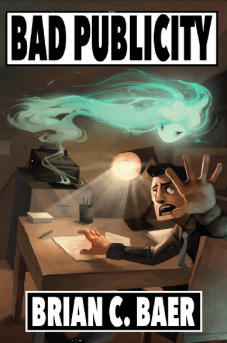
click through to purchase
A ma jor theme in Bad Publicity was secrets–their commodification, their destructive potential, the ethics of uncovering them versus leaving them alone. Can you speak to this what drove you to write about this?
Secrets and that hidden side of everyone has interested me for as long as I can remember. That, along with an interest in journalists, can probably be blamed on reading Superman comics as kid.
Everyone has secrets; they can be simple and benign or very much the opposite, but they are always nobody else’s business. Still, nothing is more intriguing. Modern day “entertainment journalism” struck me as the best way to explore this sort of voyeurism.
I was really interested in the way Madame Blue and the other ghosts played out through the course of the book. Especially with Fitzgerald, who was a new sort of medium. Can you talk a little bit more about your worldbuilding? What was it like in the afterlife for Madame Blue and the other ghosts? What was up with Fitzgerald’s ‘sensitivity’ for lack of a better word?
I didn’t get into the details of the ghosts or Fitzgerald’s gifts in the book, because those ideas are just so cool and I didn’t want to sidetrack the main story too much. To me, the ghosts are just a series of echoes. When you die, you can’t do anything new, but the person you were and the things you did keep ringing out. What makes Madame Blue different is a sense of agency; she is very much stuck in that one facet of her personality, but she has more control and can make more of an impact. And she gets this power from (what she perceives to be) love.
‘Sensitivity’ is actually the best word for what Fitzgerald does. He’s sensitive enough to hear those echoes, but not strong enough to keep himself separate from everything he hears. He’s an overly sensitive guy who loses himself in the thoughts of un-real people. In other words, he’s a writer.
Which came first–Jackson Hardy being a tabloid reporter or the ghosts? Or did the two sides of the plot develop together?
Those two concepts were there from the get-go. The book came from a short story I wrote about a ghost love-triangle. Jackson has this ghost he uses for his job, and the two of them developed a relationship without him realizing it. She fawns over him, but she also fills a void in his life. Then he meets a cute girl and everything goes to hell. Those two’s connection is what made me want to expand the story more.
What are you working on right now? What should readers look for from you next?
I’m in that fun process of struggling to write and over-thinking the sophomore project. I’ve been doing some travel writing and blogging for the ComicBookMedia.com site in the meanwhile, but I’m finally buckling down and working on the next novel. With any luck, it’ll be a slacker farce full of cults, military-industrial complex conspiracies, and slightly too much nostalgia for the mid-90s.
How can readers stay in the loop and get news about your projects and releases?
Well, I spend too much time on Twitter, if that’s what you mean. Follow me @BrianCBaer.
Do you have any final thoughts or words of wisdom you want to share?
Just “Never trust anyone who offers you words of wisdom”.


July 9, 2015
Advice for New Writers: Read Your Draft Out Loud
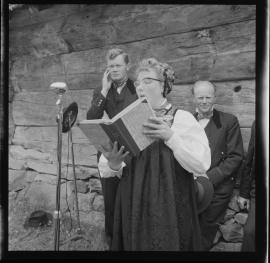
click through for source
When I first began dabbling in fiction, I would read my pitiful drafts out loud to my partner, Jon. “Can I read you this line? I think something’s wonky here.” He would say sure, and I would start to read my draft, voice wavering, blush rising, and I would hear that wrong word, that errant grammar, the same second he did.
After awhile, it became habit for me to read him finished scenes aloud. I am a terrible copy editor left to my own devices, and I found reading the draft out loud to him helped me suss out nearly all the typos and grammar errors. It also helped me work out the flow of the scene: this sentence is too long and complicated; this sentence is too short and choppy. This paragraph drags on forever. The dialogue here flowed way better in theory than in practice. Reading the written words aloud–while always a touch awkward–helped highlight weak spots I missed just by reading through the draft on my own. Often Jon wasn’t even paying attention. He was watching court TV or folding laundry or cooking dinner and murmuring sweet, supportive words of encouragement at neat, repetitive intervals. But it was good practice. I still do it with final drafts of short stories*, or with particularly difficult scenes in novels, only this time alone in my bedroom in a whisper.
The reason this trick works is because written language and spoken language are tied together. When people read, they do this thing called subvocalization: because we associate words with sounds so strongly, we mentally “speak” the words as we read them. People vary along the degree to which they are aware of which they do this, and apparently a big part of speed reading is investing in techniques to minimize one’s reliance on subvocalization to comprehend and process what you’re reading. Anyway, the gist of it is that when we talk about a writer’s ‘voice’ we are, to some extent, talking about a literal voice–so reading a draft of your work out loud to work out the kinks and zero in on what your writerly voice is when you’re getting started is not as kooky as it sounds.
Also, then, when you make it big you’ll totally have it down for your book readings.
_______
*I’m not as confident with short fiction as I am with long form fiction, so I tend to run the final draft through every test I can before sending it out for submissions. I trust my gut a bit more by now with novels because I’ve written more of them and have a better sense of what works with them.


July 7, 2015
Book Review: BAD PUBLICITY
 FTC disclosure: I received a free digital copy of this book in exchange for an honest and unbiased review.
FTC disclosure: I received a free digital copy of this book in exchange for an honest and unbiased review.
Bad Publicity, by Brian C. Baer, is a modern twist on the hardboiled noir detective story. The book centers on Jackson Hardy, a grizzled alcoholic unraveling a mystery who contends with his fair share of femme fatales and massive thugs. It all sounds very Dashiell Hammett except for the particulars.
Jackson Hardy isn’t a P.I.—he’s a tabloid reporter, and he’s not a very good one on his own.* One of the femme fatales is a ghost named Madame Blue who feeds him his sordid tidbits about movie stars. It’s these clever subversions that make Bad Publicity worth reading. Where noir literature was always a wry satire of its times—a reflection of the lose-lose nihilism of post-Depression American life—Baer’s writing sends up today’s empty fishbowl fascination with celebrity culture. To this end, making Hardy a tabloid reporter is a brilliant update of the genre.
The book follows Jackson Hardy as his use of Madame Blue (by way of an unplugged fax machine) lands him a string of high profile tabloid stories. But with those stories come ruined careers and retaliation from the movie stars he writes about. As Jackson digs deeper with Madame Blue’s help, things get stranger, questions about these celebrities pile up, and the plot twists and turns.
The structural criticisms that can be leveled against Bad Publicity are largely the same ones that can be leveled against noir fiction in general: the women characters lack dimension, and its cast is as White as fresh-fallen arctic snow. In updating the conventions of the genre, Baer could have included some diversity to his cast. Regarding the female characters, a case could be made that Jackson is, for much of the book, a drunk and emotional mess, and therefore an unreliable narrator in terms of what these women are actually like. No such excuse can be made for the lack of characters of color, though.
That said, the characters we get are well-drawn enough that they held my interest. I was particularly impressed by Jackson’s evolving relationship to Madame Blue, who grows stronger and more corporeal over the course of the book. Also of interest was Fitzgerald, presented as Jackson’s one stable friend over the course of the book.** And, last but certainly not least, a brief interlude where we meet Jackson’s estranged ex-wife proved extremely enlightening. Layla was a fascinating creature who deserved her own book, in my opinion, and enriched this one.
If you’re looking for a well-paced paranormal thriller with roots in hardboiled detective fiction, Bad Publicity will scratch that itch.
*At least not when he’s drunk, which is usually the case. When he dries out, he proves he can do the legwork without Madame Blue’s help.
**Sadly, this never panned out, but I shipped it.


July 6, 2015
Roundup: June 29-July 5th, 2015
Wanderings on the Internet
A piece I wrote about parenting with mental illness, post-partum anxiety, and therapy was published at The Fem Magazine. It has a happy ending.
Check a fresh new batch of Supernatural Haikus.
Writing Update
Resistance was nominated for the Gaylactic Spectrum Award! Here’s to the longlist!
The Search crept from 67k to 69k. Shayat found a match.
“The Two Voyages of Pippin Tripp” is done! I clocked 3k more words in it this week to finish it out.


July 2, 2015
Measuring Success
Thanks, Lithub. I know.* (click for article)
One thing that writers always get asked in interviews, and that I’ve now gotten asked myself, is why we write. Embedded in this question is a question of success: what are you trying to achieve with your writing? How will you know when you have achieved it?I write because I like to write. And I still like to write–so I am successful on that front.
I write because we need diverse books. I want to contribute to a body of literature that gives voice and life to positive representations of queer characters, women characters, trans* and gender variant characters, characters with disabilities, characters of color, characters in poverty and characters who live at the intersections of all of these axes. I try my hardest to do this.
I publish in case the stories I create resonate with others. It’s not that literally no one will read my book. It’s that just a few people will read my books. Look, who reads book about queer elves? Queer nerds. My own people. I’m not writing for everyone. I’m a queer nerd writing books for other queer nerds. So it’s all right by my if almost literally no one reads my books, because for most people my books probably aren’t really going to resonate. Otherwise I would just write my books and let them hang out on my computer.
Am I successful with publishing these stories and books? There is definitely room to grow. Building a readership is a slow business. But it’s happening. Story by story, book by books it’s happening. Reviews trickle in, I get periodic emails from people I’ve never met who have stumbled across my work, who are moved enough to reach out to me because something I wrote resonated. Because they saw themselves in the queerness of my writing. Which is why I wrote it, and why I shoved it out there in the great glutted marketplace of stories all vying for attention in the first place: in case it made someone marginalized by society feel a little more validated.
I write to validate myself. I publish what I write to validate others like me.
Support diverse literature.
________________
*For further reading about the insularity and false-famousness of the literary world, read this fascinating interview with Nell Zink.


June 30, 2015
Book Review: SHADOWPLAY
The middle book of any trilogy has the hardest job to do: it has to complicate the overall narrative while still being its own book. Bad middle books feel like filler; hundreds of pages of marked time between two cliffhangers. Good middle books walk the fine line between staying true to the story you fell in love with in the first book and twisting it enough to keep you interested in reading the next installment.
Shadowplay, I am happy to say, is a good middle book. As the second book in Laura Lam’s Micah Grey series, Shadowplay opens after one crisis and ends with another, but the path between them never feels like filler.
The events at the end of Pantomime force Micah into hiding again, this time with Drystan at his side. Drystan calls in a life-debt from the disgraced magician Jasper Maske to secure a hiding place at the dusty Kymri Theater, and thus begins Micah’s second adventure. Again, Micah goes into hiding. Again, Micah takes on a false identity. But the difference in Shadowplay is that he does so in plain sight. And at night he has a place to return to where people know who he really is and accepts him for that. I loved that nuance.
One area ripe for exploration that was missed, though, was Micah’s new identity. In the city of Imachara, while outside on the street, Micah wears a small piece of Vestige which makes him appear to be Temnian. In the book, Temnian people are coded as people of color; visibly foreign and visible different—“from the colonies,” mistrusted. As Sam (Micah’s name when passing as Temnian), Micah should face structural oppression. Unless Ellada is much further along in terms of race relations than we are in the real world, this should probably have been more than a couple of scowls on the street as mentioned in the text. This oversight is compounded when Cyan, an actual Temnian girl, joins the group. She either never speaks of whatever structural oppression she faces or she never experiences any. She seems to have no feelings on the matter that these two White kids are passing themselves off as Temnian. I’m not saying she should be bothered by it, necessarily, but she probably should have had an opinion on it one way or the other. In any case, there is a potential for this element of the book to rub readers of color the wrong way since Micah is literally using race as a costume for large sections of the book without any substantial reflection of what that means.
That said, I did truly appreciate that in Shadowplay Lam began to unweave Micah’s intersexuality from his apparent special abilities around Vestige*—which become more pronounced in this book. We learn more about that in Shadowplay; the Phantom Damselfy herself becomes a prominent character with a name and a history and a future. We also learn that there are others with similar abilities in Micah’s world. It’s confirmed more than once over the course of the book that it may just be coincidence that Micah is intersex and has these abilities. Micah is allowed to be just Micah.
Shadowplay is excellently paced and explores a different part of Elladan culture than Pantomime—magic shows and seances. I, actually, am fascinated by the historical spiritualism movement and the practices of debunking seances, so this was an oddly perfect match for my interests. Between Micah’s Phantom Damselfly induced visions, magician training, and tracking down people who are tracking down him, there is plenty of plot to go around. There are double agents. There is a slow-burning, very sweet romance, but not before the trauma of the ending of the first book has to be dealt with and processed by both Micah and Drystan. There is the question of Micah’s weird abilities and the potential and the danger they pose. And there is a hell of an ending and the questions it raises
I cannot wait for Masquerade**.
* If Lam’s interactions on twitter are any indications, and I can’t imagine why they wouldn’t be, she appears to be a lovely and reflective person.
**Also, I the behind-the-scenes story of the third Micah Grey book is a pleasure in and of itself.


June 29, 2015
Roundup: June 15-June 21, 2015

Black whalers in New Bedford, MA
Paperbacks, Sales, and Free fiction!
Want Ariah in ebook format but haven’t gotten around to picking up your copy? Now is your chance! In honor of the recent SCOTUS ruling legalizing same-sex marriage, Ariah is available for $1 here until July 1st. Support queer love; support queer books!
Or, maybe you’ve been holding out for a paperback copy of Ariah. Well, you’re in luck there, too! Ariah is now available in both ebook and paperbook formats over at Amazon (though neither of those are on sale, FYI).
Also in honor of the SCOTUS ruling, I compiled three of my short stories–all F/F, all with happy endings, two of which feature characters of color–into a FREE collection called #LoveWins. You can download it here in mobi, epub or pdf: http://tinyurl.com/lovewinsstories
Ramblings Around the Web
#LoveWins (the gay marriage ruling, not my book of short stories, omg I am not a monstrous egoist) is undeniably important, but we must remember it’s one battle among many. And we must remember that #BlackLivesMatter
On a lighter note, there are always new Supernatural Haikus to be had over here.
Writing Update
The Search crept from 64k to 67k. Both Sorcha and Shayat miss each other, but neither will admit it (cue Dawson’s Creek theme song).
I started a short story tentatively titled “The Two Voyages of Pippin Tripp” and knocked out 3K words out of it. I probably have about 2k in it to go. It’s a retelling of pieces of Moby Dick from the perspective of Pip, the young Black cabin boy who goes mad. Sidenote: the history of Black whalers is utterly fascinating.


June 26, 2015
#LoveWins Sale! ARIAH available for $1
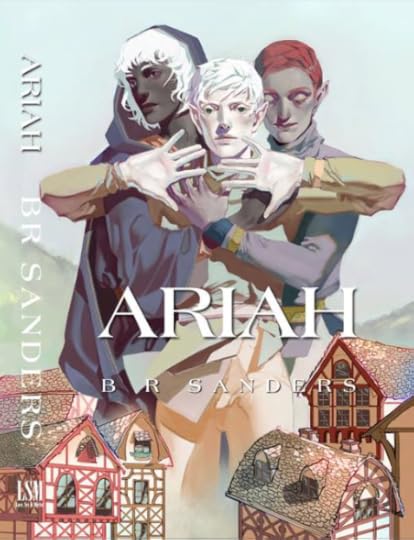
The Supreme Court voted today to make gay marriage legal across the entire country. In honor of this momentous occasion, my publishing house, Zharmae Publishing Press, is having a sale on several LGBT titles, including Ariah, via https://payhip.com/tzppbooks.
The sale is running until 7/1/2015, and you can get an epub version of Ariah for just $1!
Support queer love. Support queer families. Support queer books. #LoveWins



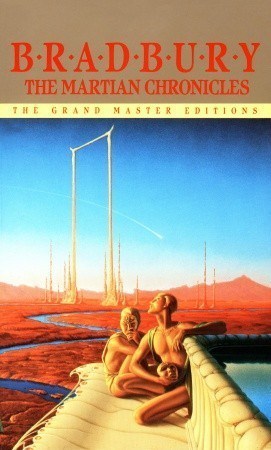


![CropperCapture[73]](https://i.gr-assets.com/images/S/compressed.photo.goodreads.com/hostedimages/1436443215i/15458770._SX540_.png)
![CropperCapture[57]](https://i.gr-assets.com/images/S/compressed.photo.goodreads.com/hostedimages/1435917454i/15389550._SX540_.png)
